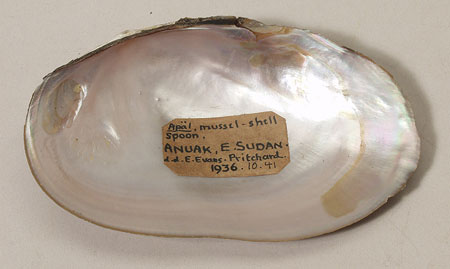Accession Number:
1936.10.41
Country:
Sudan
Region:
[Southern Sudan]
Cultural Group:
Anywaa [Anuak]
Date Made:
By 1935
Materials:
Mussel Shell , Mother of Pearl Shell
Dimensions:
L = 110 mm, W = 65 mm, Ht = 20 mm; th = less than 1 mm [RTS 18/6/2004].
Weight:
24.7
Local Name:
apäl
Other Owners:
Presumably collected by Evans-Pritchard during his period of fieldwork amongst the Anuak between early March and May 1935 [RTS 18/6/2004].
Field Collector:
Edward Evan Evans-Pritchard
PRM Source:
Edward Evan Evans-Pritchard
Acquired:
Donated 1936
Collected Date:
March - May 1935
Description:
Spoon or scoop made from one half of a mussel bivalve shell, separated from its paired shell at the hinge, but not obviously modified in any other way.
The object is irregularly oval in plan view with a convex underside that has a darker brown surface layer (Pantone black 7C) that has partially flaked off over a translucent caramel coloured surface (Pantone 730C).
Both surfaces have laminated away from the apex, to expose the opalescent white colour of the underlying mother-of-pearl.
There are patches of weathering over the rest of the exterior; the unweatherred surfaces appear to have a natural polish.
The interior hollow is concave and made of the natural mother-of-pearl lining of the shell, which is an opalescent light purple to white colour (Pantone 663C), with some yellow surface staining.
This object is essentially complete, apart from the surface damage mentioned and some edge damage, possibly from use.
It is 110 mm long, 65 mm wide and 20 mm high; the shell itself is less than 1 mm thick, and has a weight of 24.7 grams.
Presumably collected by Evans-Pritchard during his period of fieldwork amongst the Anuak between early March and May 1935 (see (E.E. Evans-Pritchard, 1940, The Political System of the Anuak of the Anglo-Egyptian Sudan, p. 3).
The local name for this type of object was apäl. For similar spoons made out of mussel shells, see 1936.10.41-43; for a variant shell form with serrated end, see 1936.10.44-45. None of these shells make up the two halves of a single bivalve. These spoons were stored in a small basket, 1936.10.46, called akoga . Similar shells, used as spoons or ladles, are known amongst the Dinka Tuich (see 1979.20.57-8). Patti Langton described these as 'oyster' shells, but they seem to be of the same type, and are probably also mussels.
Rachael Sparks 20/08/2005.
Presumably collected by Evans-Pritchard during his period of fieldwork amongst the Anuak between early March and May 1935 (see (E.E. Evans-Pritchard, 1940, The Political System of the Anuak of the Anglo-Egyptian Sudan, p. 3).
The local name for this type of object was apäl. For similar spoons made out of mussel shells, see 1936.10.41-43; for a variant shell form with serrated end, see 1936.10.44-45. None of these shells make up the two halves of a single bivalve. These spoons were stored in a small basket, 1936.10.46, called akoga . Similar shells, used as spoons or ladles, are known amongst the Dinka Tuich (see 1979.20.57-8). Patti Langton described these as 'oyster' shells, but they seem to be of the same type, and are probably also mussels.
Rachael Sparks 20/08/2005.
Primary Documentation:
Accession Book Entry
[p.
410] - 1936 [insert] 10 [end insert] E.
EVANS-PRITCHARD, M.A., Exeter College, Oxford.
- Specimens collected by himself in the EASTERN SUDAN, while travelling with a Grant from the
Rockefeller
Leverhulme Trustees, viz: [p.
412] [insert] 40-43 [end insert] - [One of] 4 Valves of mussel-shells,
apäl
, used as spoons, ANUAK.
Card Catalogue Entry - There is no further information on the catalogue card [RTS 30/1/2004].
Old Pitt Rivers Museum label - Apäl, mussel-shell spoon. ANUAK, E. SUDAN. d.d. Evans-Pritchard 1936.10.41 [label stuck to inside surface; RTS 18/6/2004].
Card Catalogue Entry - There is no further information on the catalogue card [RTS 30/1/2004].
Old Pitt Rivers Museum label - Apäl, mussel-shell spoon. ANUAK, E. SUDAN. d.d. Evans-Pritchard 1936.10.41 [label stuck to inside surface; RTS 18/6/2004].






